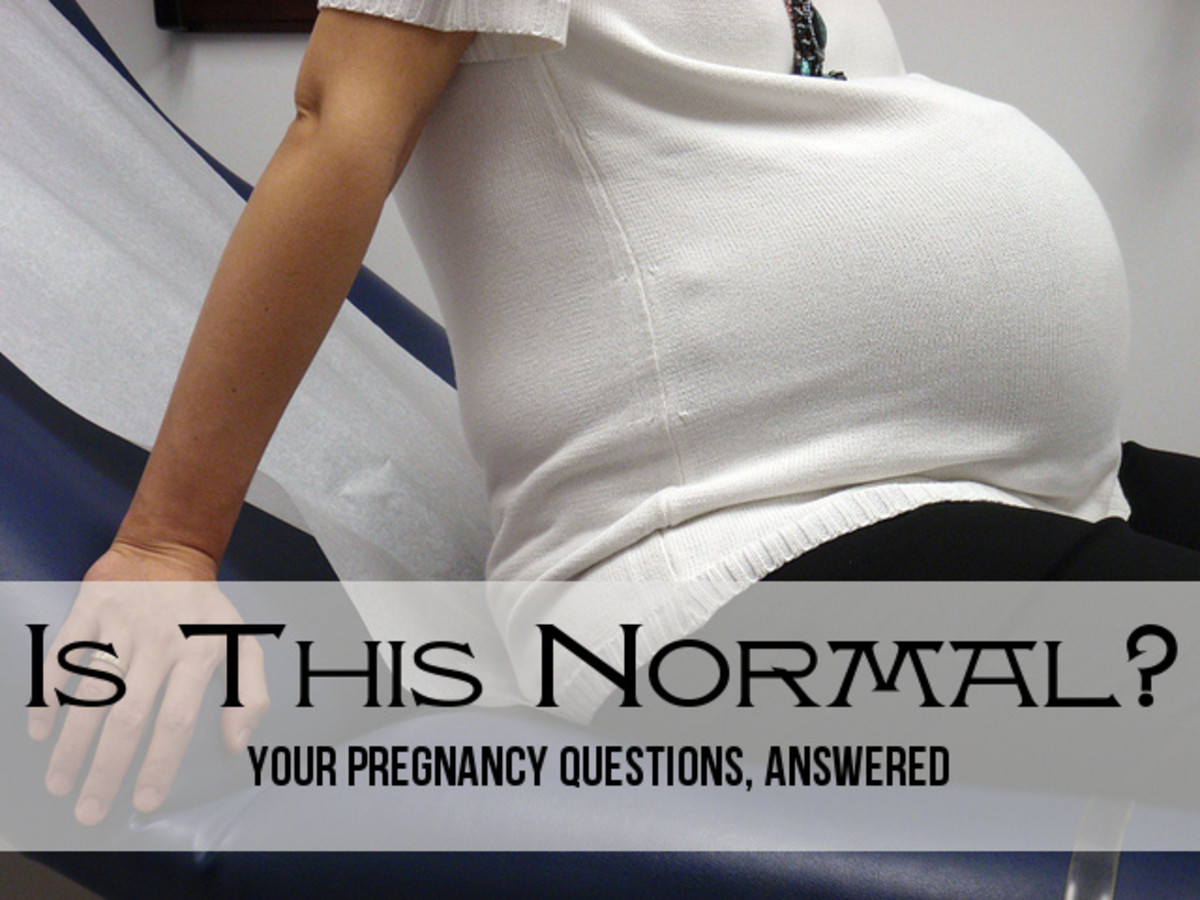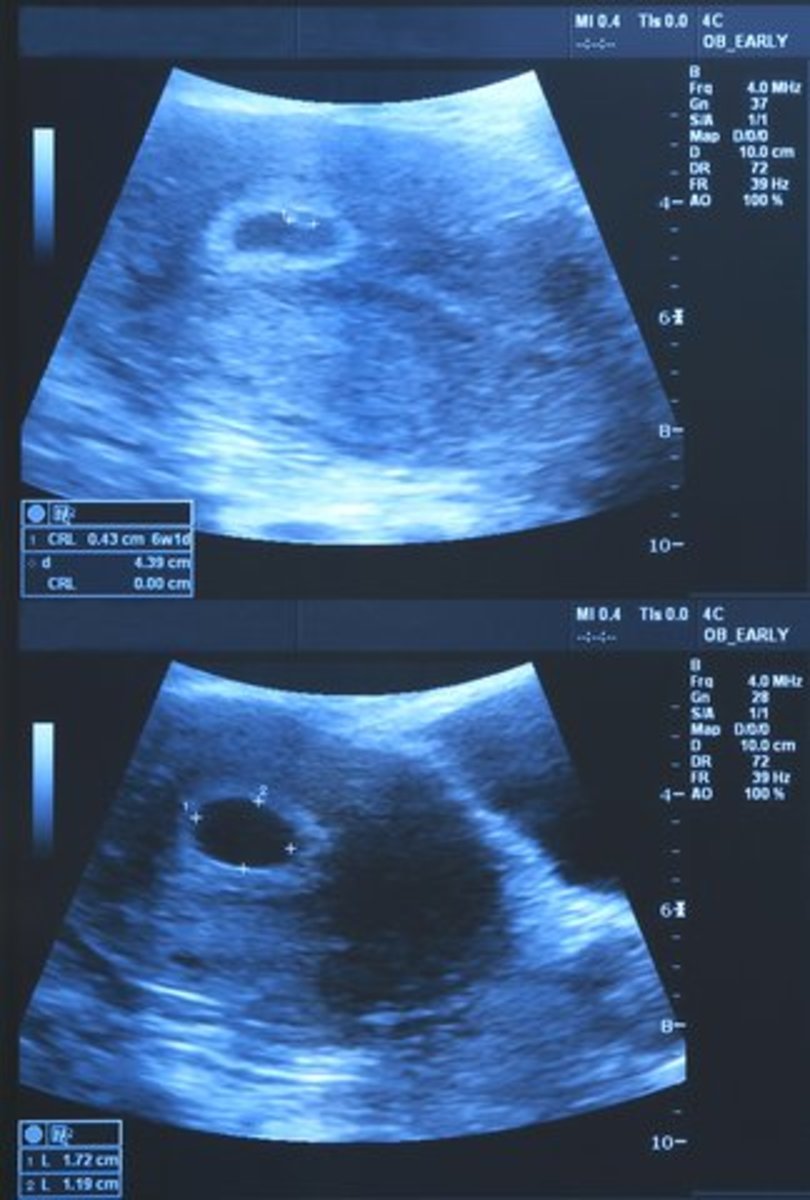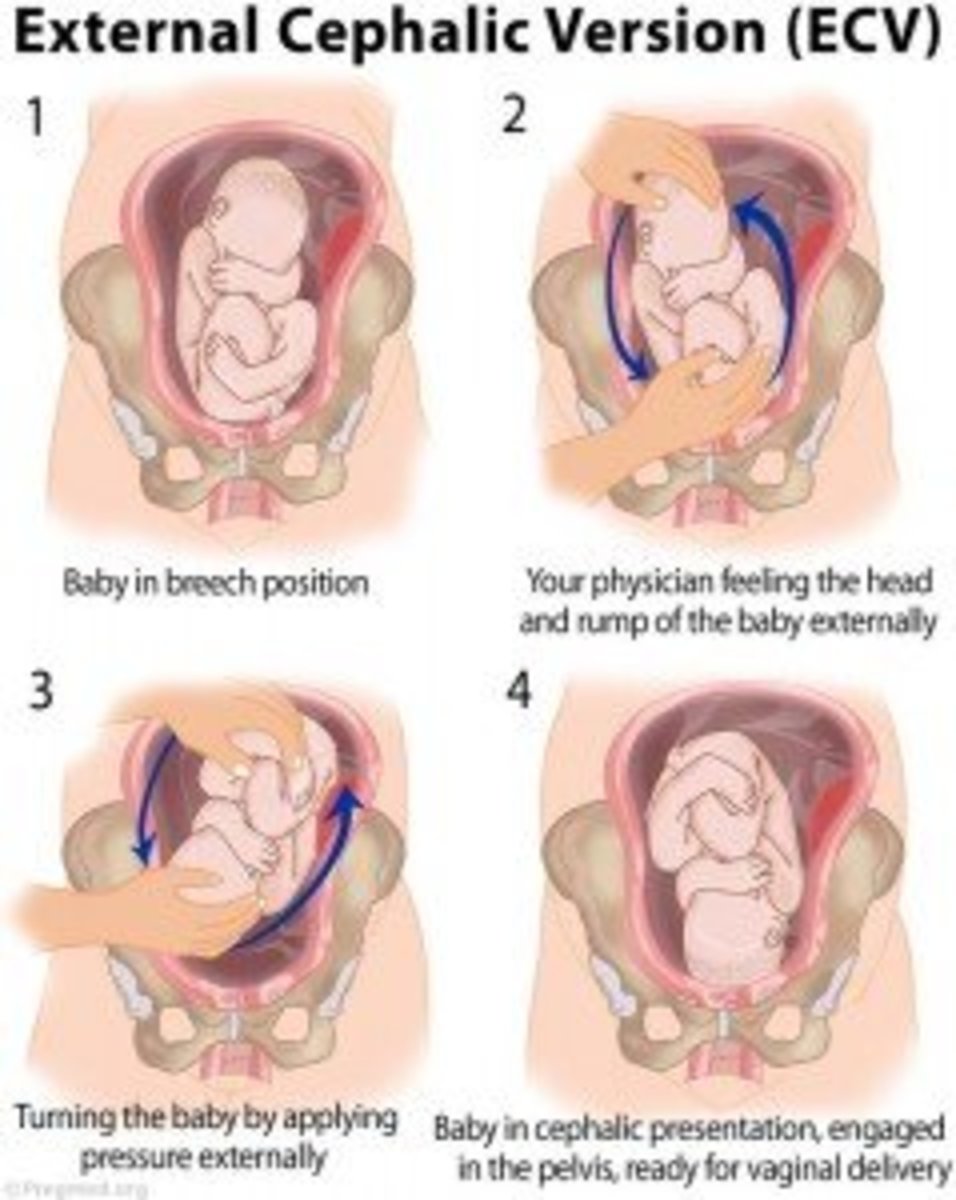Importance of Water in a Healthy Pregnancy
A surprising number of problems in pregnancy can be traced to not drinking enough good, clean water. It sounds simplistic, but water actually plays a critical role in pregnancy––from the ability to fertilize an egg to the ability to give birth. Consider these facts:
- One third of a pregnant woman's weight gain consists of the baby (75% water), the placenta, and the amniotic sac filled with liquid. Another third consists of an increase in breast and other tissues, plus extra blood (95% water). The remaining third is for body fat and retained water.
- Drinking plenty of water can prevent conditions like constipation, hemorrhoids, bladder infections, and excessive swelling - all common during pregnancy. (Mayo Clinic)
- Drinking water needs to be as free from contaminants and chemicals as possible, e.g. purified in some way.
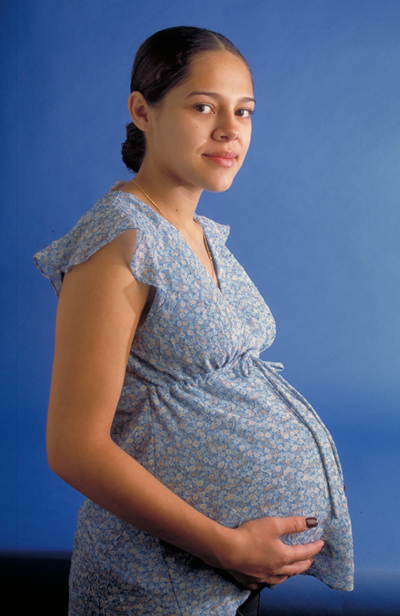
If you're not drinking enough water, your body is already giving you signals. You may not recognize them as such, but they're there, and will get worse with pregnancy, because growing a baby doubles the need for water. Here are a few symptoms you may be ignoring:
- You're often exhausted. One of the main causes of exhaustion is not enough oxygen in your cells. Guess what carries the oxygen around the body? Your blood, which is 95% water.
- When you exercise or it's hot, you hardly sweat at all. Sweating is a good thing. It washes out your skin cells and cools your body down. But water has to be in your body first, in order to sweat it out.
- You regularly get headaches. The brain contains a high percentage of water, and the cushiony layer just inside the skull also is mostly water. When you don't drink enough, the skull presses into your brain and causes all kinds of pain.
- You should be peeing several times a day. If you don't and your pee is yellow, you're not drinking enough water. Peeing is how your body eliminates toxins collected by the kidneys. Those toxins are held in your bladder until it has enough water to expel everything. When you don't pee, the toxins accumulate and cause problems.
The following chart shows many of the complications that arise when you, as a prospective mother, do not drink enough water to keep your pregnancy healthy. Following that is a description of how water contributes to each stage of your pregnancy. Note that, although some problems are caused by other things as well, anemia is the only one that's not related to drinking too little water.
Common Pregnancy Problems & Causes
Condition
| Lack of Water
| Improper Diet
| Lack of Exercise
| Stress
|
|---|---|---|---|---|
Anemia
| x
| |||
Backache
| x
| x
| ||
Bleeding
| x
| x
| ||
Breech baby
| x
| x
| ||
Constipation
| x
| x
| ||
Cramps
| x
| x
| ||
Diabetes
| x
| x
| ||
Excessive heat
| x
| |||
Excessive swelling
| x
| |||
Faintness
| x
| x
| x
| |
Headaches
| x
| x
| ||
Hemorrhoids
| x
| x
| ||
Indigestion/heartburn
| x
| x
| x
| |
Itching
| x
| x
| ||
Nauseousness
| x
| x
| x
| |
Overweight
| x
| x
| x
| |
Premature delivery
| x
| x
| x
| |
Tiredness
| x
| x
| ||
Urinary tract infection
| x
| |||
Varicose veins
| x
| x
|
Morning Sickness and Lack of Water
Some women, who normally drink a lot of water, get nauseous when they try to drink during pregnancy. The key here is to drink in small amounts. Add a little lemon to counteract the nausea. Drink ginger tea. And eat food that contains lots of liquid, like watermelon and cucumbers.
Also be sure to eat smaller, rather than larger, meals each day and eat more often. Keep snacks around, like homemade trail mix, and start nibbling first thing in the morning. Cherries and grapes are great snack foods too.
If you're drawn to snacks you know are unhealthy, look to see what they're doing for you. If salty, it could be that your body craves salts to offset too many sweets. Eat fewer sweets and start using sea salt when you cook, instead of regular table salt (which has most likely been chemicalized). If your craving is for ice cream, your body may need more sweet fruits. I've noticed that when I eat a lot of fruit, I become uninterested in cake, candy, or other sweet desserts.
The nausea is caused by your body's producing a bunch of new hormones and shifting the hormonal balance around to set up healthy conditions for your baby to grow inside you. Don't be afraid of it (fear also causes nausea). Give yourself plenty of rest and don't work too hard. Give your body what it needs and be happy you're receiving these signals.
What is your experience?
How many problems from the chart have you had while pregnant? Include morning sickness.
Stages of Pregnancy and the Role of Water
In your body, as a whole, water transports nutrients and oxygen, cleans out toxins, conducts electrical messages, and keeps your body cool. During pregnancy those functions increase to include the growing baby. Here is the specific role water plays in pregnancy, starting from fertilization of the egg through actual birth.
Fertilization - Pre-pregnancy
One doesn't normally think of water as having anything to do with fertilization, but . .
Q: How does sperm get to an egg?
A: With a powerful ejaculation of liquid made up mostly of water.
If your man hasn't been drinking enough water, he will not have a powerful enough stream to send his sperm the distance. He may not even be able to "get it up" if he's too water deprived.
Meanwhile, you need to have enough water for your reproductive organs to jump into action when a connection is made. Your vagina, uterus, and fallopian tubes should be moist enough to let his fluid slide by on the way up, and to let the egg slide down to the uterus, once it's fertilized.
If your partner is lacking, the chances for pregnancy may be reduced, but if both of you are lacking, fertilization cannot take place. This may be rare, but it is still a good idea for both of you to make sure you drink enough clean water regularly, if you want to reproduce.
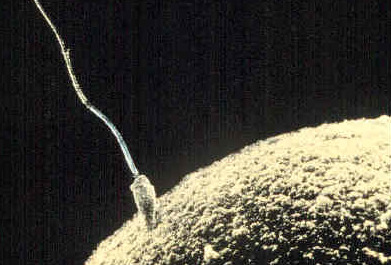
The Zygote Stage - Day 0 to 5
When sperm meets egg under the right conditions, they join themselves together and begin to grow. We call the growing organism a "zygote." Each cell of the zygote is made of a combination of male and female DNA. Each cell reproduces its own self, until the zygote is big enough to fold over, as it travels down the fallopian tube to your uterus. This process takes about five days.
During the previous month, your uterus has been building up its interior lining (endometrium) to make it nice and thick, in case an egg gets "hot." If you have enough water in your body, the endometrium will be rich and moist enough to catch the zygote as it slides past, in which case the zygote will bury itself into the lining and start hooking up with nutrients there.
If you haven't been drinking enough water, the lining will be too thin to catch the zygote, and it will slide on by out of the body.
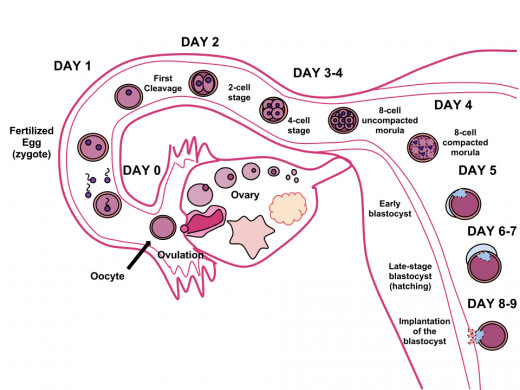
The Embryo Stage - Day 5-7 to quickening
We change its name to "embryo" as soon as the zygote buries itself in the uterine lining. At that point, your endometrium sends out zillions of alerts to the rest of your body, preparing it for pregnancy and also telling it not to attack the embryo.
These alerts are hormones transported by water in the blood. Your breasts start to swell and become tender, your skin clears itself out with moisture sweating from its surface, and your may become nauseous, as your body prepares to share food.
The embryo, meanwhile, is growing around the fold it made on the way down, and cells are starting to differentiate into body parts and organs. The embryo forms an umbilical chord from which it can feed, and a sac around it that fills with liquid. This is called an "amniotic sac" and is intended to cushion the growing organism from shock and allow it to move around without disturbing you much.
At about week six, the embryo's rudimentary brain begins to activate and the newly formed heart starts a weak beat. Blood (water filled with nutrients) starts to flow. Then the eyes, hair, and face start to form as the embryo floats in its amniotic sac filled with fluid.
From fertilization to the end of the embryo stage, the trip takes about 9 weeks. The embryo is just over 1" long. This very sensitive period is when the majority of natural miscarriages occur. Both bodies are sensitive to the right conditions and the right patterns of development for a healthy baby. If anything looks like it's going wrong, they will abort the project. Your body will shed you endometrium and the embryo with it, like you do with a normal period. This is a very common occurrence with all women.
(Disclaimer: Sorry there's not a photo here. They're available, and there are some very good ones, but Hubpages doesn't want them. They had me remove one, and unlinked its replacement themselves.)
The Fetus Stage - Week 9 to full term
Once past this stage, when the embryo is formed enough to start moving, it enters the "fetus" stage. During this stage the brain is starting to create nerve pathways throughout the body, which is starting to twitch and twist in response. The organs continue to grow and specialize. The heartbeat is stronger, the digestive system begins to operate, the lungs are practicing breathing (without taking in air). At about week 20, movements are strong enough for you to feel them. This is called "quickening."
The body of the fetus, before birth, is more than 75% water. Bones are still soft, though they start to harden after about week 26. The fine hairs all over the body disappear, except for the head, where they become coarser. Movements are more purposeful. The continuously replenishing fluid in the amniotic sac allows for the fetus to move, to turn with the movements of your body, and be protected from any direct hits.
By the end of this six month stage, organs and body parts are fully formed and most are functioning, although weight is still low. By week 37 the fetus is complete enough that it could be born and still live without major complications. Now it can be called a baby. According to Wikipedia, 30% of new birth deaths come from fetuses being born before 37 weeks. Although many babies are born before this stage, they are not born without complications.
Chemicals and Pregnancy
Crucial to bearing a healthy baby is minimizing the amount of chemical intake - from our air, food, and water. Avoid house sprays and paints, eat organically, and drink filtered water.
Full Term Pregnancy - Weeks 37 to birth (about week 42)
This stage is where the baby and mother prepare themselves for birth. The baby's circulatory system begins to shift away from the umbilical chord, from whence all nutrients and blood supply have been coming so far, readying itself to receive oxygen from the lungs, once the baby starts breathing. The lungs and nervous system complete their separation, while the lungs finalize themselves for breathing air.
The baby also puts on weight and gathers strength, moving more often and pushing harder. Within your soft, moist uterus, the baby turns itself head down in readiness for birth, aided by gravity (assuming you walk enough), dropping down in your belly, pressing against your bladder. This increases your need to urinate, which increases your need for water even more.
Birth - Week 42 or thereabouts
Instead of berating the need to pee all the time as the baby presses hard against your bladder, you could take this need as a signal that the baby is nearly ready to emerge. At this time, you should make sure you're drinking enough water to replace what's being peed out, and to help with the emergence.
For a baby to slide out of your vagina during birth, the vagina needs to be moist. The baby's amniotic sac will break, thereby sending its fluid out the vagina and helping with the moisturizing. But birth will be hard, if the combined moisture is not enough.
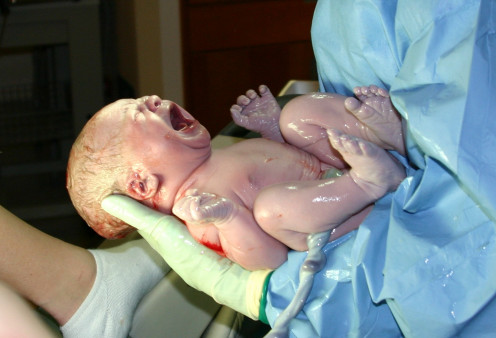
Preventing Risks in Pregnancy
Note how a simple thing like drinking enough good quality water during pregnancy can make the whole process so much easier. Of course, these aren't the only complications that can arise, but why not eliminate these first, before worrying about others?
Doctors are not trained to keep a person healthy, but rather to diagnose and ameliorate pain, once a person's health is suffering. Doctors should be the last resort, not the first go-to when you're feeling bad.
Prevention is key and is the responsibility of each mother-to-be. There's a lot you can do for yourself, starting with increased water intake:
- Drink more water. STOP drinking soft drinks, and limit your coffee.
- Check your diet and look for herbs to supplement your pains.There's plenty of information on the Internet, and most doctors don't know about (or believe) the powerful effect that healthy herbs can produce.
- Make sure you're getting reasonable (not strenuous) exercise, like walking and swimming.
- Check your stress level––not just emotional, but also physical and mental. Are you doing too much? Are you thinking or worrying too much? Are you doing too little? Sometimes boredom causes stress too.
- Look for psychological worries, fears, resentments and talk them out with a friend. Let yourself cry, if you feel like it. Crying is a huge releaser of tension that can heal your body as well.
Once you've taken care of as much as you can, then refer any remaining problems to a doctor. If it were me, I'd start with a massage therapist, an acupuncturist, and a reiki practitioner, before seeing an allopathic doctor. Pregnancy is meant to be a healthy event that you share with a developing baby. Once you hit the "regular" doctor, they're looking for the need for drugs or operations. Those are last ditch treatments in my book––the most destructive and the least effective.
My mother had eight children (and one miscarriage) in ten years––boom, boom, boom, popping out of her body like rabbits. One of them she came close to having in a taxicab. She had been raised on food grown in her mother's backyard, so was used to eating healthy. She was raised Mormon, so was used to drinking water, not coffee or sodas (or alcohol). She didn't have a drivers license, so was used to walking everywhere. And she was surrounded by church members who completely supported her in being pregnant, including my father. That's not to say we were all born perfect, because we weren't. There were toxins in the air where she lived, which did affect her pregnancies. But we were all healthy, and so was she.
Although I know every woman's circumstance is different, I tell you this because I know that a healthy lifestyle helps women bear healthy children. So remember to eat well, exercise moderately, keep yourself happy, and drink plenty of water.
Reference Sources:

Additional References
- Pregnancy nutrition: Healthy-eating basics - Mayo Clinic
Pregnancy nutrition is important for you and your baby. Here's help making every bite count. - Dehydration During Pregnancy: Symptoms and Prevention
Looking for information on dehydration during pregnancy? If so, you may need to read this article on the symptoms, effects and prevention of dehydration.

